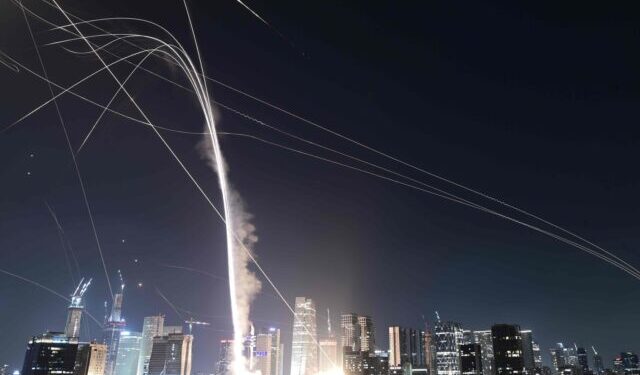Iran Launches Missile Barrage on Israel in Retaliation—Civilians Injured as Tensions Escalate
The Middle East conflict took a dangerous new turn Friday night as Iran retaliated for Israel’s earlier military strike by launching a barrage of ballistic missiles, some of which reached Israeli cities, including the densely populated hub of Tel Aviv.
According to Israel’s Army Radio, Iran fired approximately 150 missiles in the first wave alone, marking one of the most direct and aggressive attacks from Iran on Israeli soil in recent memory. Although Israel’s Iron Dome and air defense systems successfully intercepted many of the incoming threats, several missiles broke through and struck targets in central Israel.
One video circulating on social media shows the dramatic moment Israeli defenses lit up the night sky—intercepting missiles mid-air—only to have one slam into downtown Tel Aviv, erupting in an explosion among skyscrapers. The images were jarring, a stark reminder that the threat from Iran is both real and dangerously close.
Initial reports said seven people were injured, with one in moderate condition. Later updates from social media and emergency services increased the number of wounded to 40, including two critically injured. Many of these were civilians, highlighting a key distinction between Israel’s and Iran’s approach to warfare.
As noted by the Israel Defense Forces (IDF):
“While Israel had targeted Iranian military sites, the Iranian regime was targeting Israeli civilians.”
This statement cuts to the heart of the conflict. Israel, acting in preemptive defense against an Iranian regime dangerously close to building a nuclear weapon, struck military infrastructure. Iran responded not by hitting Israeli bases, but by firing into civilian population centers—an act that many observers see as reckless and in direct violation of international norms.
The first wave of missile attacks occurred shortly after 10:00 p.m. local time. It was followed by a second wave targeting northern and southern Israel. Though this second barrage caused no reported injuries, it triggered air raid sirens across vast parts of the country and sent families scrambling back into shelters.
In total, ten missiles reportedly landed in Israeli territory during both waves, according to Army Radio. The IDF later revised the count, stating that fewer than 100 missiles had been launched, although confusion remained as Iran claimed a third wave was underway by 10:09 p.m..
The IDF also released a map showing the locations where air raid sirens were triggered, further confirming that the missile fire was widespread and not confined to one region.
Israel’s Home Front Command—the civil defense authority—issued a brief window of relief after the first two attacks, telling Israelis they could exit their shelters but should stay nearby in case another barrage was launched overnight.
This proved to be prudent advice, as new sirens sounded again just hours later.
While Israeli citizens are no strangers to missile threats, this was a reminder that Iran’s involvement in the conflict has entered a more dangerous phase, and not just through its proxies like Hamas or Hezbollah—but directly from Iranian territory.
As Breitbart and The Daily Wire have highlighted in recent weeks, this conflict isn’t just about one-off missile attacks—it’s about Iran’s pursuit of nuclear weapons, its willingness to provoke war, and its brazen targeting of civilians to escalate tensions with the West.
Iran’s leaders, under pressure from internal dissent and facing economic sanctions, may see war as a way to rally their population and distract from their own regime’s failures.
Meanwhile, President Trump’s recent remarks on Truth Social underscore what’s at stake:
“Iran now has a second chance to come to the table.”
He’s made it clear—diplomacy is the preferred path, but it must be backed by strength. And when Israel acts to prevent a nuclear catastrophe, it is not just defending itself—it’s sending a warning to every radical regime watching.
The missile barrages on Friday night were not just retaliation—they were a test. A test of Israel’s defense systems, of Western resolve, and of whether the world will finally take Iran’s nuclear ambitions seriously.
As the situation unfolds, Americans should be asking:
- Why is Iran emboldened enough to attack directly?
- Will the Biden administration continue to pursue soft diplomacy with a regime that targets civilians?
- And most importantly—what message are we sending to our allies and enemies when the far-left attacks Israel for defending its own people?
One thing is clear: the stakes have never been higher, and the divide between those who stand with Israel and those who side with its enemies is growing more visible by the day.




















